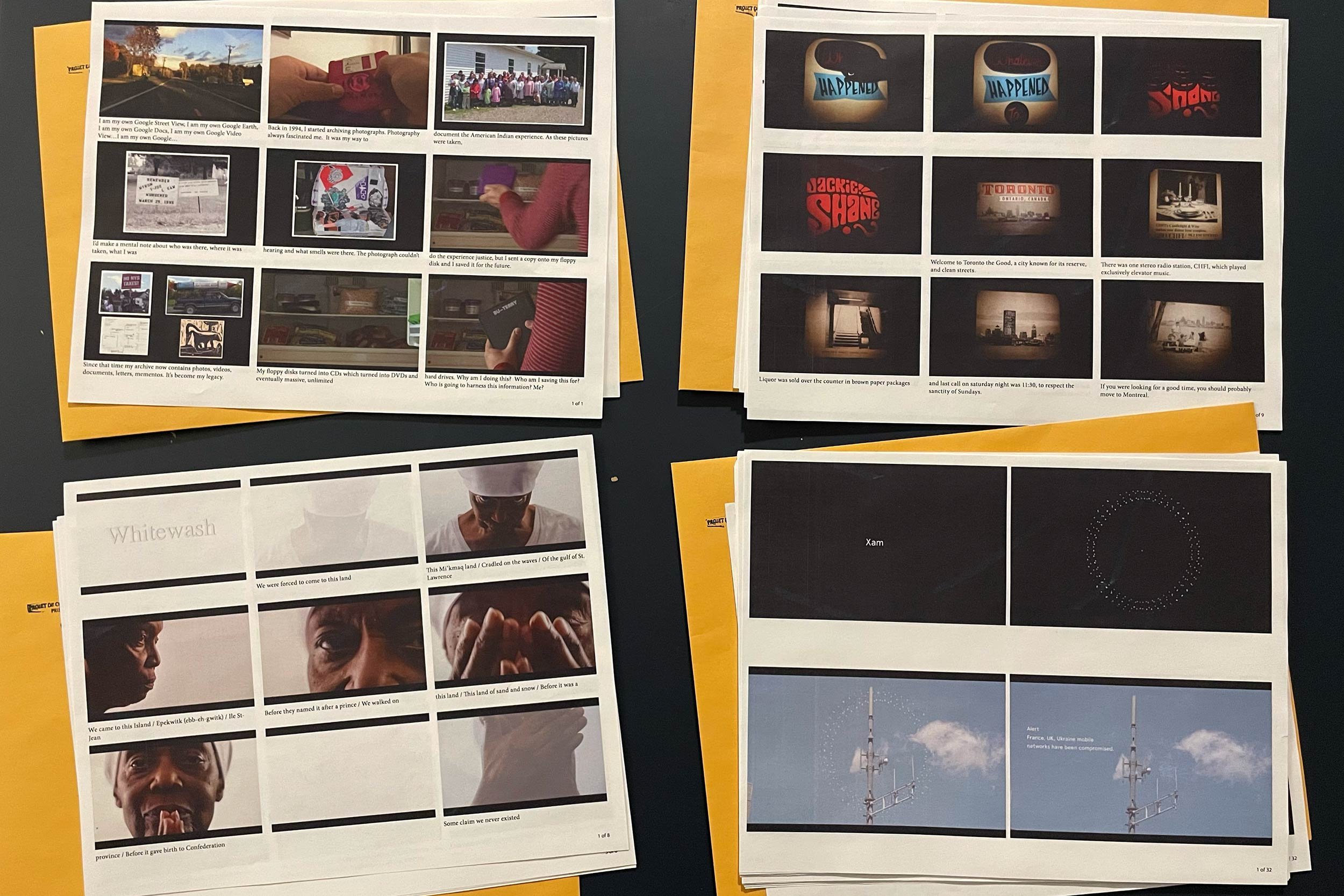Kriss Li
Abolition Film Society
in collaboration with Amber Kim
From November 14, 2024 to January 18, 2025
Opening on November 14 at 6 pm
— Facebook event
Kriss Li is a multimedia artist who creates films, installations, and conceptual projects that explore structures of power. Amber Kim is a trans woman, activist and author, currently serving a life sentence without parole in a correctional facility in Washington state. Abolition Film Society (2022-2024) results from their exchanges, instigated after participating in a reading group conducted by telephone and Securus, a fee-based online communication tool for people in prison. Working around the prison’s many restrictions and highlighting the freedom of communication taken for granted by those on the outside, the project reorganizes cinema’s components into a multiform correspondence addressing carceral capitalism and prison reform.
In one video channel, Amber Kim uses stacking (adapted from ASL by prisoners for communicating across distances or plexiglass) which, in the second channel, is interpreted by Kriss Li through filmed images. Marked by a pronounced difference in sharpness and saturation, the images contrast the collaborators' lived reality. Li additionally converts their film images into a flipbook to circumvent prison regulations, permitting Kim to see the film on which she collaborated. Accompanying the flipbooks are excerpts from their many online and telephone conversations. Through this long-distance dialogue, the collaborators deliberate the many instances in which power and capital maintain an order wherein punishment is favored over care.
Also at the heart of Abolition Film Society is the question of representation and agency. Various legibilities of power dynamics between the artist-ally and the subject of their cause proactively ask: what role do prisoners have in abolition activism? How are they “conceptualized”*? And how might their voice be centralized in the movement for their liberation — or at the very least, in the art that portrays them?
Kriss Li investigates the divisions and hierarchies that maintain the social order, and the hidden sites of possibility that can be exploited towards greater collective capacities. Their artistic practice is informed by extensive engagement with community organizing, especially at Prisoner Correspondence Project, a volunteer-run solidarity initiative for LGBTQ prisoners where they've been a collective member since 2009. Li’s work has been shown extensively in film festivals, including screenings at DOC NYC, International Short Film Festival Oberhausen, Images Festival (Toronto), Vancouver International Film Festival, Athens International Film + Video Festival, Kassel Documentary Film and Video Festival, International Documentary Film Festival of Mexico City, Bucharest International Experimental Film Festival, and Laceno d'oro International Film Festival (Italy). They have done residencies at Amant New York (USA), Kulturhaus Villa Sträuli (Switzerland), Antenna’s Paper Machine Residency (USA), Struts Gallery, Vidéographe, Céline Bureau, and Ada X (Canada). They’ve programmed for Plug In Institute of Contemporary Art, Vancouver Queer Film Festival, and Slut Island Festival (Canada).
Session
Session 36
Kriss Li
On December 5, 2024 at 7 pm
Outreach
Meet the artist
On December 7, 2024 from 2 pm to 4 pm
Come see the exhibition and chat with Kriss Li!
Other exhibitions
Jin Heewoong
Work of Rest
From November 14, 2024 to January 18, 2025
Veronica Mockler
I Won’t Do It Alone
From November 14, 2024 to January 18, 2025
Dazibao thanks the artist for their generous collaboration as well as its advisory committee for their support.
Dazibao receives financial support from the Conseil des arts et des lettres du Québec, the Canada Council for the Arts, the Conseil des arts de Montréal, the ministère de la Culture et des Communications and the Ville de Montréal.
Dazibao acknowledges that it is located on the unceded territory of the Kanien'kehá: ka Nation and that Tiohtiá:ke / Montreal is historically known as a gathering place for many First Nations, and today, is home to a diverse population of Indigenous as well as other peoples. Guided by ethics of respect, listening, and awareness, Dazibao commits to a continued reflection regarding the deep-rooted and systemic challenges tied to accessibility and inclusivity in the arts and beyond, and endeavors to apply such reflections to all aspects of its activities and governance.











